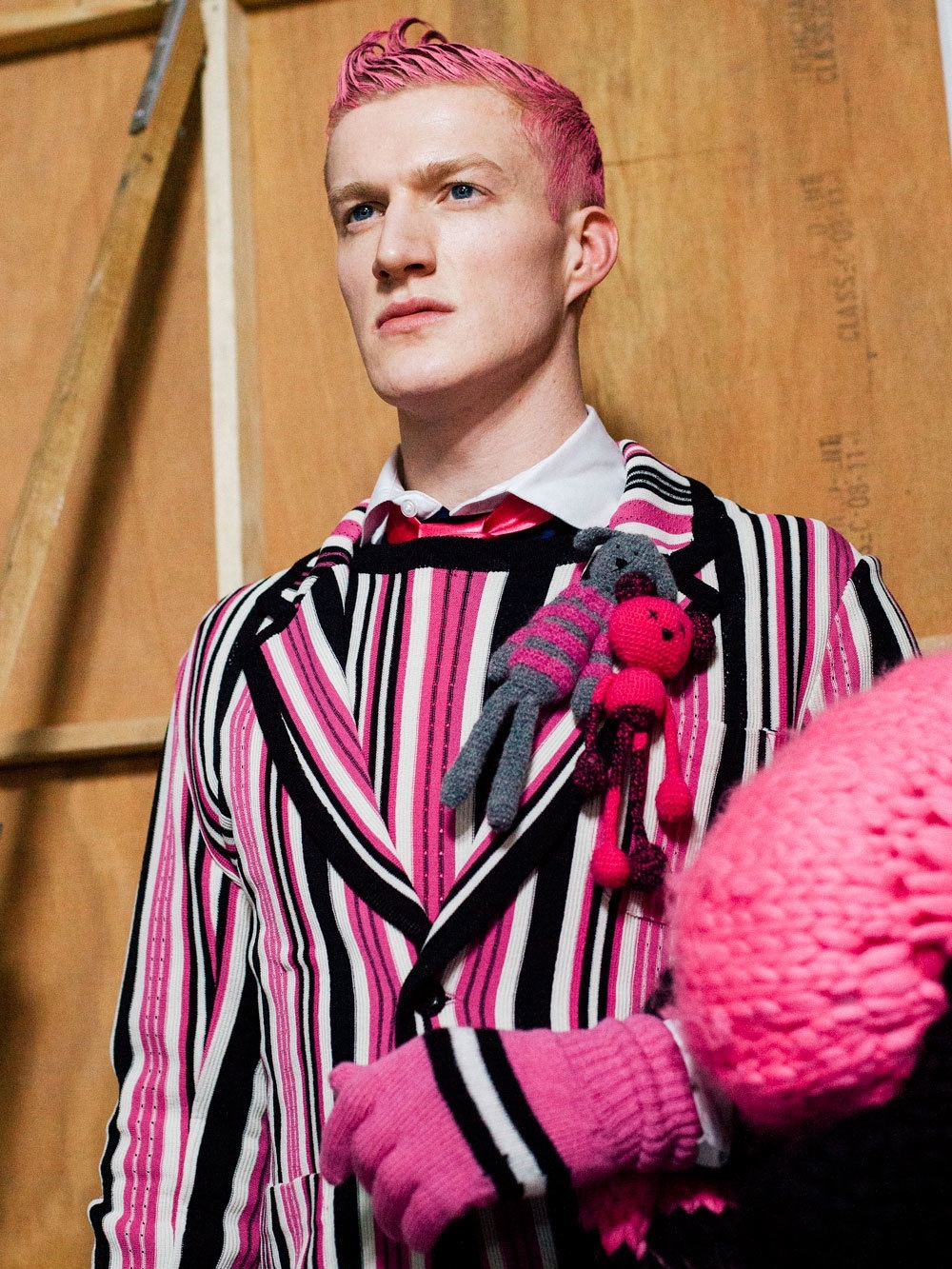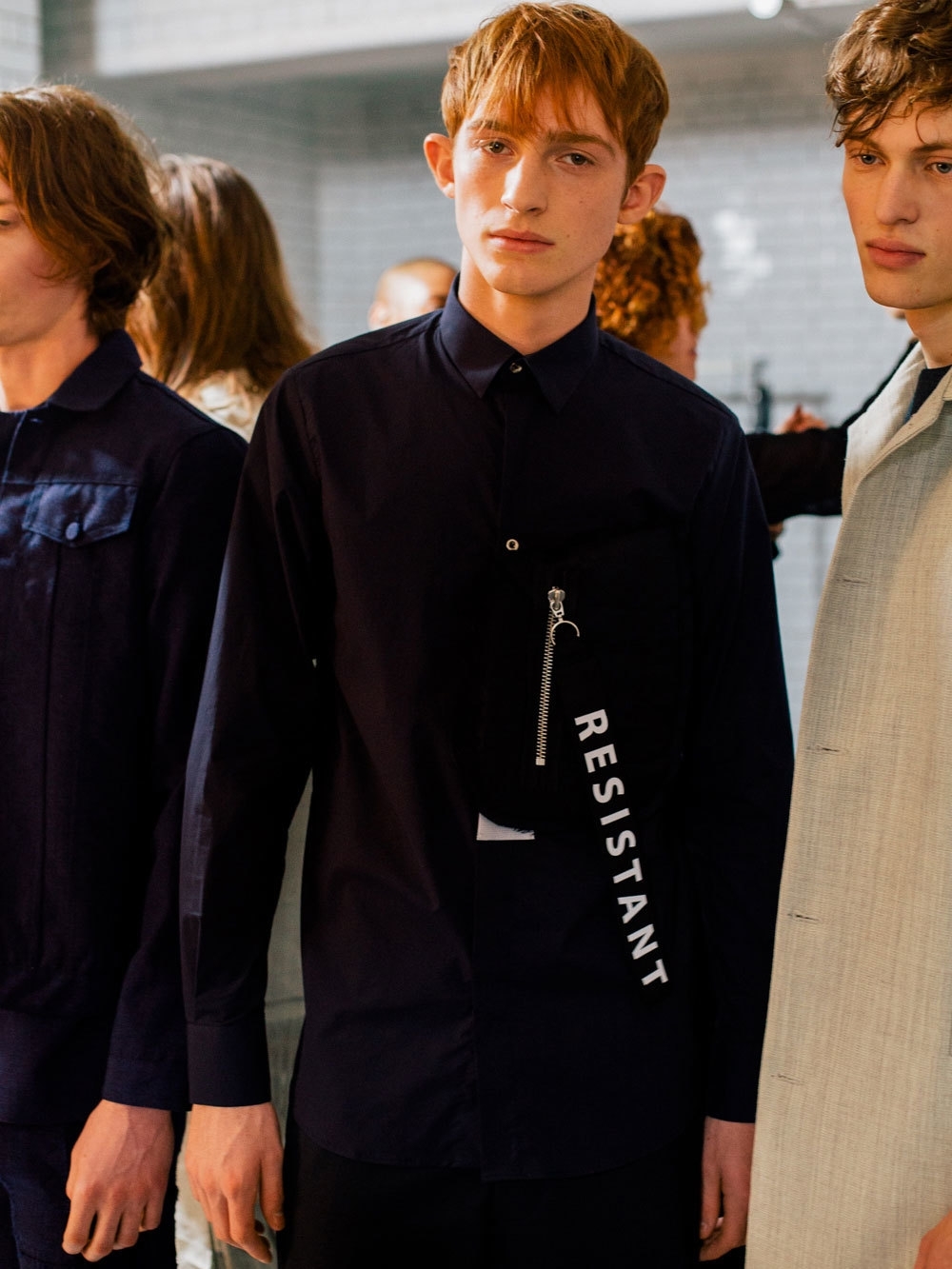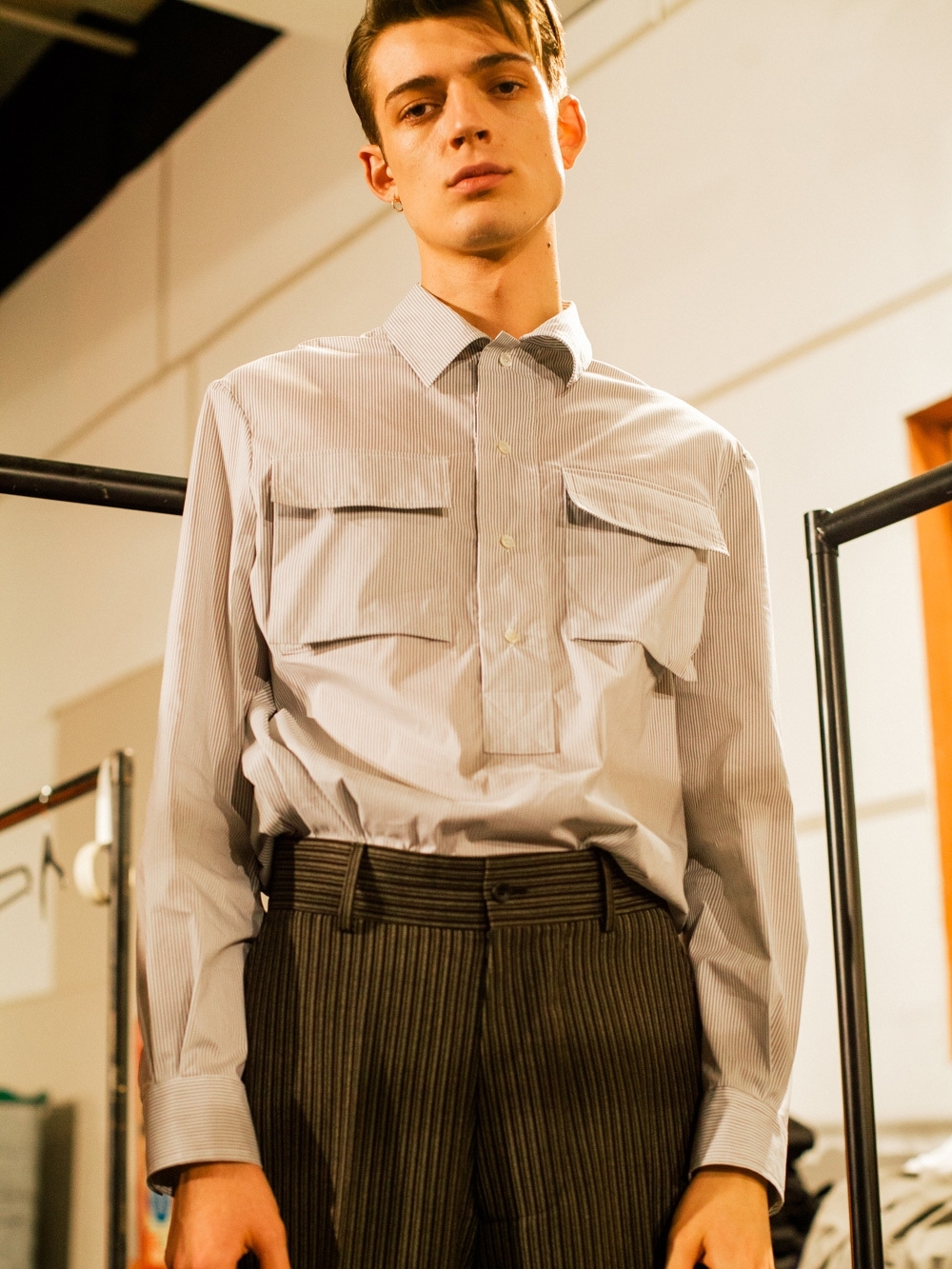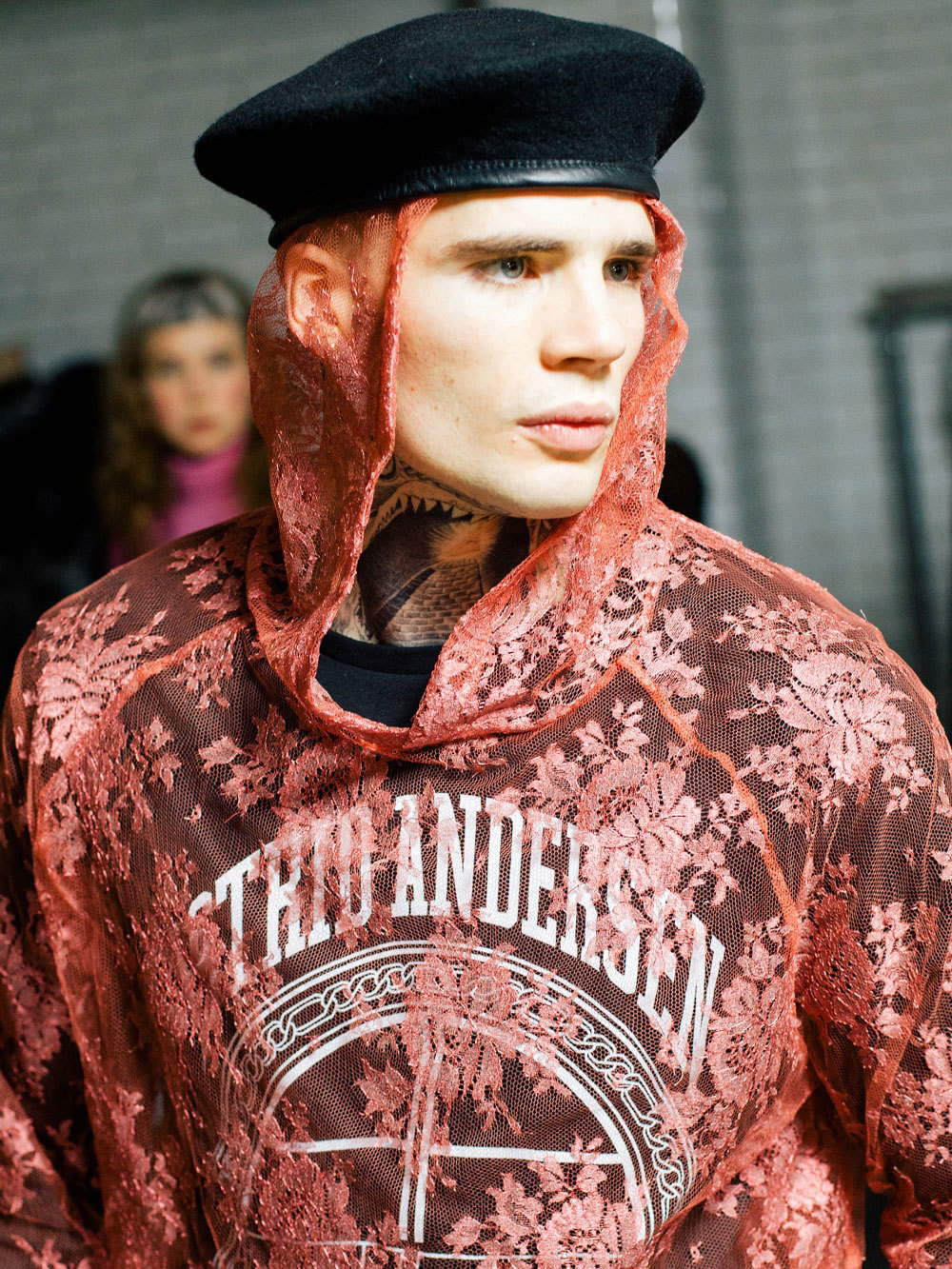Following months of measured mentoring, commercial soul searching and spreadsheet head scratching, five of London’s brightest menswear talents battle it out to follow in Christopher Shannon’s trainer-clad footsteps in being awarded the latest BFC/GQ Designer Menswear Fund. Established in September 2013 and supported by VERTU, the fund provides one designer with £150,000 grant to provide necessary infrastructure to take them to the next stage of their business in addition to a high level mentoring support programme over a twelve month period. Beyond the fanfare of LC:M, this is about the real business of London menswear. Before Astrid, Matthew Miller, Patrick Grant of E. Tautz and the Sibling family present their final plans to the judging panel, i-D quiz them on their past, present and future.
What can you tell us about the application process? Harrowing? Meditative? Fruitful? How would you describe it in your own words?
Cozette: As with any application the thought of applying is the daunting part, once you get over yourself and take the time to sit down and write your business plan it’s actually pretty rewarding.
Astrid: This has been one of those short listings where you really gained so much knowledge even before there’s a winner announced. The mentoring sessions have been super inspiring and really help focus your work moving forward.
Matthew: Intense, like Inception, on acid. As soon as you start a business plan the levels of information you can go into are insane, you could spend a life-time planning a lifetime.
Patrick: In the normal course of things you never get a minute to think about next week let alone next year and the longer term future of your business so being forced to sit down and really mull things over is genuinely useful. Doesn’t mean it isn’t a killer but having been through this twice with the BFC/Vogue Fund and once before on the BFC/GQ Fund, it definitely helps.

What’s your coping strategy for when you present to the judges? Will you be imagining them naked?
M: Aha ha ha ha, no. There’s so much information that I literally just have a series of images to look at and the image represents everything I have to say, the 30 page business plan is far too much to remember, and literally makes me want to kill myself. So I simplified it into a series of images that I can just talk about and i’ll wing it from there.
C: Oh my, now please don’t put that idea in my head as I will get a fit of embarrassed giggles. I’m bad enough in menswear fittings to the point where Joe threatens to bar me. Anyway swiftly moving on – we will cope by doing what we do best: being ourselves.
A: Haha! No I don’t think that would help me very much! I always focus on the fact that it’s nothing like exams because there’s not a curriculum you may not have read or understood. I am my brand everyday so nobody understands it better. There are definitely people that are able to ask questions about the business that I can’t but as soon as I hear them I’m very grateful because they trigger a thinking process for me, that’s what these mentoring sessions have done too and what I hope tomorrow will be like.
How has the application process for the prize shifted/cemented your understanding of your labels?
M: It’s put a timeline for growth in motion for sure, and a very clear strategy for the next three years.
C: Well it’s got me over my fear of business plans that’s for sure. Massimiliano Pogliani from VERTU made a very good point: your business plan is your sat-nav and you use it to help you navigate as you push your business forward, that it’s a working document for your business not just something you hand over to potential investors with little thought. Doing the plan, having really great mentoring means that all 3 of us have a better understanding as to how we work and, most importantly that our business is working. Sounds idiotic but you get so caught up with the day to day, the shows, the press, sales and the creative that it’s great to be reminded with bare facts and figures that you are doing well and also be shown where and how you can make improvements.
A: It’s definitely made me aware of focusing my energy and setting my goals, short and long term. I need to create a business where everyone understands the direction and this requires me to be able to express this on paper so that all that information can be passed on, updated, revisited, altered along the way and create a frame for the direction.
P: As I say it really forces you to think about who you are, who your customer is and what he really wants from you. The mentoring process forces you to ask difficult questions and be honest with your answers. It exposes the strengths and the weaknesses and forces you to find ways to better leverage the former and to find strategies to cope with the latter. I think we now have a much clearer idea of who we are and why people care about our brand.

If you were to win, how do you think it can most help you and your your business?
M: It will give the business a great platform to excel but it won’t massively change the business to be honest. The design ethos and principal will remain.
C: SIBLING is a small business growing into a medium sized one so any support whether financial or through mentoring can only be beneficial as we continue to restructure. To win would be an incredible achievement but we’ve gained so much insight already that even losing is winning – if that makes any sense and doesn’t sound to Miss World? What I’m trying to say is that everything has been a positive. It’s been an invaluable experience for us.
A: It can help me optimize all our channels from securing a preordered production flow and a quality level of sales and distribution that will prepare us properly for the growth that the brand is experiencing right now. It will allow me to hire staff which will essentially enable me to focus a bit more on the create drive behind the brand.
P: Our plan is very clear about what we’ll do but I’m not giving it away at this stage.
What has been the biggest lesson learned since launching the label?
M: That’s quite a had question I’ve learnt so much, and there so much more to learn. I think the key piece of advice I would say to people is that you learn far more from failing than winning.
A: That you need to genuinely like the people you trust.
P: This stuff is hard, men are loyal creatures and building a menswear label takes time, it requires perseverance, and actually a lot of physical effort. But it’s also bloody good fun.
Where do you see your labels in five years time?
C: Harder, better, faster, stronger to quote Daft Punk and still happy to quote Pharrell
A: As a strong independent lifestyle brand. I believe in 5 years people will no longer talk about this aesthetic as a trend or will have the need to define it as a term, it will simply be a very clear direction of a new luxury that will grow in demand.
M: On holiday hopefully.
P: Hopefully once we iron out the wrinkles a couple more stores, a handful more great wholesale accounts and a few more great people in the team.

What advice would you give young people wishing to follow in your footsteps?
C: Play nice, play true and play fair. That with friends, family and support you’ll get there.
A: Work harder than you imagine you ever could.
M: Don’t let anyone ever tell you, you can’t do it. Just fucking do it!
P: Be prepared for a breadline existence and be completely true to your own creative vision, it’s that uniqueness that will make customers love your brand and buy your clothes in a tough competitive world.
What excites you most about tonight and beyond?
C: Actually I’m sick with nerves but that’s good, I get sick with nerves as the boys get into line up for shows! Nerves are good I’ve been told. Beyond that LCM SS16: bring on getting banned from my own fittings due to giggles.
A: It’s a privilege whenever you have a panel of knowledge and expertise to revise your thoughts and plans – even though the situation itself is intimidating and not truly enjoyable its one of those moments that keeps you working harder.
What is the future of fashion?
P: Fashion bridges the world of clothing and that of art, music, culture. It’s that intersection that makes it interesting to be in and makes customers love our brands. Fashion has to continue to excite and enrich people and to remain culturally relevant whether that’s with the clothes we make, the way we make them or the people we surround ourselves with. Fashion needs good thinkers and in that respect right now in London it’s in a good place.
M: New design excites me. I think the RCA graduate show in a few weeks is going to be mega, for them they think this is the end, but trust me, it’s just the beginning.
Credits
Text Steve Salter
Photography Piczo
